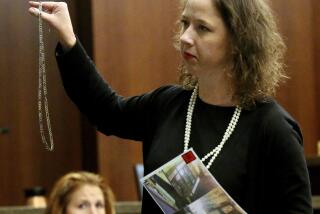Prosecutors to Answer Charge in Murder Case
- Share via
A judge has ordered two veteran prosecutors to answer allegations next month that they intentionally withheld information about the mental stability of convicted killer Michael Raymond Johnson.
The charges--being leveled by Johnson’s lawyers--open the door for a rare civil contempt hearing before Presiding Superior Court Judge Charles W. Campbell Jr.
The hearing will mark the first time that local prosecutors have faced such allegations over a death penalty case. If cited for contempt, Deputy Dist. Atty. Maeve Fox and former Deputy Dist. Atty. Matt Hardy each could face $500 fines or five days in jail.
The charges come two years after Hardy and Fox secured a murder conviction against Johnson in the 1996 slaying of Sheriff’s Deputy Peter J. Aguirre Jr. The 26-year-old officer was shot execution-style while responding to a domestic disturbance call at the home of Johnson’s estranged wife in Meiners Oaks.
Prosecutors argued that Johnson, on death row in San Quentin State Prison, committed cold-blooded murder, but defense lawyers instead maintained that their client was a schizophrenic suffering from paranoid delusions at the time of the shooting.
The jury rejected the defense’s position, and Johnson, then 50, was sentenced to die.
*
Nearly a year later, prosecutors notified the state Supreme Court that they had withheld from the defense a confidential memo summarizing psychologist Daniel Martell’s opinion that Johnson was indeed mentally ill.
The nine-page memo, written by Fox just before the start of Johnson’s penalty trial, stated that Martell, a consultant for the prosecution, believed Johnson was suffering from a mental disease.
“One of Martell’s comments to us was, ‘I wish I was working for the defense on this case,’ ” Fox wrote. “He indicated that this indeed is a ‘rare’ case in which the defendant does indeed suffer from exactly what the defense says he does.”
Martell never examined Johnson, but based his evaluation on a review of documents in the case. He was not called as a witness.
Instead, prosecutors called a different psychologist who testified that Johnson was sane.
Defense attorneys argued that the memo on Martell should have been turned over to them because prosecutors are obligated to promptly reveal information that tends to show a defendant’s innocence or could affect the severity of the sentence.
“It appears that a legal duty was violated in a substantial matter that is worthy of an explanation,” said Deputy Public Defender Neil Quinn, who plans to present evidence at the Feb. 22 contempt hearing. “We can’t just let this go by.”
In November, Johnson’s lawyers filed a motion asking a judge to compel the two prosecutors to show why they shouldn’t be held in contempt. Campbell granted the request a month later.
“Our position is that this is not a matter of just legal ethics, but a matter of legal obligation and legal duty,” Quinn said Wednesday.
But prosecutors maintain they did nothing improper.
They argue in court briefs that the memo was a confidential “work product” and protected from disclosure by law. Additionally, they say Martell was a consultant whose opinions needed to be shared.
Fox, however, disagreed. “When I made the decision not to turn over the information in question I believe I made the right decision and I still believe I made the right decision,” she said Wednesday.
*
She said she intends to testify at the hearing.
Hardy, who no longer works for the district attorney’s office, could not be reached for comment. His attorney, James M. Farley, would not say whether Hardy plans to testify.
How the contempt hearing may affect Johnson’s appeal of his conviction and sentence remains to be seen.
“I don’t know whether the outcome of this proceeding will have any effect on Johnson’s appeal,” Quinn said.
But prosecutors argue the contempt hearing is a veiled attempt to dig up information that could assist in an appeal.
“There is a concern on our part that they are using a procedure of contempt against two deputies who gave their heart and soul in this case and who have good reputations,” Chief Assistant Dist. Atty. Greg Totten said.
“It is not appropriate from our view,” Totten said. “The court has disagreed with us.”
The contempt issue aside, Totten said, there was nothing in the memo that cast doubt on the correctness of the jury’s verdicts.
The existence of the memo came to light after one of Johnson’s lawyers, Deputy Public Defender Todd Howeth, became suspicious that notes on Martell’s opinions might exist and asked the prosecution about it.
In a subsequent letter to the Supreme Court, Dist. Atty. Michael D. Bradbury said his office did not concede that the defendant would have been entitled to the information in the memo during the trial.
Totten said Wednesday the district attorney elected to turn over the memo to the Supreme Court because “it has always been our long-standing policy to be as thorough as possible.”
Totten said it might have been prudent to have turned the memo over earlier, but not wrong.
More to Read
Sign up for Essential California
The most important California stories and recommendations in your inbox every morning.
You may occasionally receive promotional content from the Los Angeles Times.










